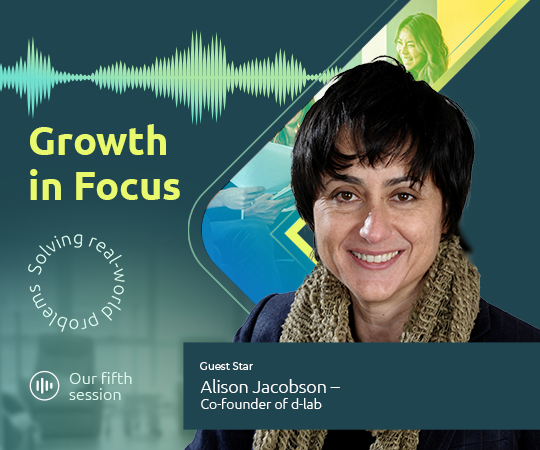Podcast
Thought Leadership
Growth in focus - d-Lab
25 November, 2025
Welcome to Growth in Focus, where business and industry leaders provide valuable insights into their thinking. In an interview with futurist and economist Bronwyn Williams, Alison Jacobson, a co-founder of d-lab, outlines how her organisation is addressing South Africa's skills gap through innovative education approaches that directly impact business competitiveness and economic growth.
d-lab is a non-profit organisation that provides digital workplace readiness skills, including design thinking and AI literacy, to unemployed black youth across the country. Through this hands-on work, Alison has seen firsthand where the education system falls short.
In South Africa, the unemployment rate for youth who completed Grade 12 is 48%, while 80% of 10-year-olds are unable to read for meaning, even in their home language.
She points to three major challenges for South African businesses:
- What students learn doesn’t match what companies need
- Schools and training programmes don’t prepare graduates for jobs
- Skills shortages hold back business growth
Alison is very clear about what needs to be done: "Our education system does not have a product-market fit. And until we address that, I don't think we're going to be competitive.”
Altron is actively tackling the challenge of product-market fit education through its Ascent and MathU programmes.
Ascent provides financial support, mentorship, and real-world experience in the ICT sector, and offers qualifications through selected universities and training colleges. MathU, however, focuses on all STEM subjects by making quality math education accessible to high school students.
“Innovation is not about coming up with ideas. It's about executing.”
Alison Jacobson, a co-founder of d-lab
.png?width=100&height=100&name=Untitled%20(100).png)

Are we thinking the way we should be thinking?
One of the most significant shifts in building a productive workforce is that, nowadays, what matters isn't just a diploma; it's whether someone can actually do the job. Alison's approach at d-lab reflects this transformation.
"The skill we're teaching, or if I can put the emphasis rather on the students, what they are learning, is how to work well with others to solve complex problems. That's the skill of the future."
d-lab focuses on developing what Alison calls "digital workplace readiness skills," including design thinking, digital and AI literacy and team-based problem-solving.
This approach addresses the reality that businesses need employees who can think critically, adapt and work effectively in teams to solve complex problems.
AI tutors will drive change
Alison believes technology, particularly AI, represents the most significant opportunity to address South Africa's education crisis.
"If there's anything that's going to sort of help the country educationally and help the youth, it's going to be technology-driven. It's going to be AI tutors in the hands of even children in poorer communities because the price points will lower, and these things are going to spread and become … universally ubiquitous."
"Give every child in the country access to something equivalent to a ChatGPT, teach them really how to use it, give them adult supervision and create structure and infrastructure."
Supporting this view is a comment made previously by Dr Yaw Osei Adutwan, the former Ghanaian Minister of Education:
“We can’t memorise our way out of poverty … We have tamed the children. We just want them to write down what we tell them and that on the day of exams, they should put down what we have told them…”
Local can be globally lekker
Despite South Africa's challenges, Alison sees unique opportunities emerging from the country's circumstances.
"What's wonderful about South Africa is there's no shortage of [problems]. So, lots of opportunities. And it creates innovation. It creates a sort of agency that can't arise if you don't have that level of challenge."
She identifies a distinctly South African capability: "We seem to have the most extraordinary capability to innovate. We mustn't lose that. That has to be fostered."
This innovation-through-necessity mindset positions South African businesses to develop solutions that could have global applications.
Growing economic participation
At d-lab, success is measured by economic results: "Our outcome is not how many people we train, it's actually how many become more economically productive and successful. And they're achieving that through many means. Some are getting hired by corporates, some are building their own businesses, some are working on a gig freelance basis."
Businesses must develop the skills they want
Alison emphasises that addressing South Africa's skills challenge requires active corporate participation.
She advocates for outcome-based thinking: "We need, as corporate South Africa, in my opinion, to be demanding the outcomes we're looking for, not a pass rate, which is premised on a 30 percent threshold."
Corporations must collaborate with educational institutions to create economically productive individuals rather than just those with a Matric.
South Africans always make a plan
Despite the challenges, Alison remains positive about South Africa's potential.
"The optimistic message for me is that no one's coming to save us and we will save ourselves."

What d-Lab can teach us
- d-lab's model demonstrates that business growth requires:
- Focus on business outcomes rather than on training outputs
- Recognition that future skills are fundamentally about human collaboration and problem-solving
- Acceptance that technology must be the enabler of educational transformation
- Understanding that innovation emerges from constraint and challenge
- Commitment to public-private collaboration beyond traditional boundaries
As Alison notes: "Study anything that's going to develop your brain and make you think. But it doesn't have to be formal. Learn to make things. Learn to do things. You could learn, as Elon Musk has often said, everything you need to know is on YouTube."
Explore our previous episode with Adrian Saville
In this instalment of the Growth in Focus series, futurist and economist Bronwyn Williams speaks to Professor Adrian Saville, a professor in economics, finance and strategy at the Gordon Institute of Business Science (GIBS) and the Rotman School of Management.
Explore now